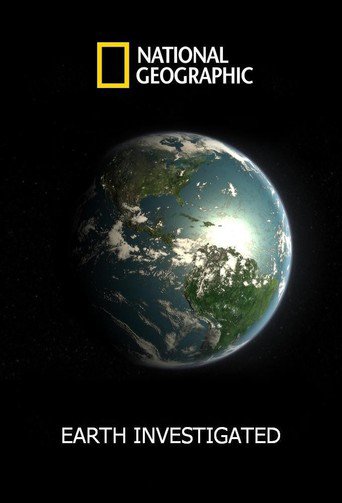With 30 Day Free Trial!
Earth Investigated
2005Watch Trailer
With 30 Day Free Trial!
Earth Investigated Season 2010 Full Episode Guide
It may be the best documented meteorite fall in history. Scientists at the University of Western Ontario record a meteorite lighting up the Canadian skies one a Friday night. Using a network of cameras, radar and listening equipment they had aimed at the skies, they know where to hunt for the rock that entered our atmosphere from outer space.
In July 2008, paleontologists Nadia Frobisch, Jorg Frobisch, and Lars Schmitz unearthed the nearly complete fossilized remains of a 35 foot, 240 million year old Ichthyosaur in Nevada's Augusta mountains. Scientists instantly knew this creature would have been the top predator of the oceans in its time. Now, the investigation begins into this unique creature as scientists attempt to understand where it fits in the evolutionary history of the first sea reptiles.
With most of the planet covered by oceans and overcrowding an issue on land, the time may be right to turn the science fiction idea of living beneath the sea into a reality. This episode examines what it would take to construct and operate an undersea colony of 100 families. The technology that could make it happen is already being developed.
Some believe that man's insatiable desire to alter his environment is actually causing natural disasters. Urban sprawl perhaps strengthened a tornado in Atlanta; massive amounts of coal and water removal may have triggered Australia's strongest-ever earthquake; natural gas drilling causing a mud volcano in Java; these specific examples examined.
Have you ever seen lightning strike from the ground to the sky or float in midair? Spectacular and exotic forms of this natural phenomenon are slowed down on film to reveal minute detail. Luminous spheres that linger in airplanes are recreated. We will show you how rockets launched into storm clouds coax lightning down to earth. Naked Science: Lightning Chasers illuminates secrets of nature's most striking
This episode provides answers to the unlikely question of what would happen to our planet if it should stop spinning. Day and night would each last for six months on alternating sides of the planet; sea levels at the equator would drop; the atmosphere would disappear and life as we know it would not survive.
As the sun continues to age, it becomes increasingly hot and begins to expand, eventually swallowing up Earth. The temperatures on our planet will rise, turning the third rock from the sun into a scorched and uninhabitable wasteland. The changes our planet will undergo are depicted.
This program looks at the remarkable occurrence of the total solar eclipse over Easter Island on July 11, 2010. The program looks at the science of the sun as it is revealed via the eclipse phenomenon and then takes us "near live" to the actual event as the film will be aired domestically only a few hours after it takes place there.
Cameras offer a rare look inside the Navy's latest weapon in the fight against terrorism: the USS Florida, a guided missile submarine. In a Joint Operations mission, the sub smuggles Navy SEALS ashore to identify a terrorist location and the use shipboard guided missiles to destroy the target. The technology on the sub allows it to operate quieter and stay underwater longer than previous ships.
Dead Tired uncovers research exploring whether tiredness may lead to heart attack, diabetes, obesity, and depression. In a unique TV experiment, witness what happens to a healthy 25-year old when he cuts back his sleep from eight to three hours a night for one week. The results are shocking! He loses lucidity, dreams whilst awake and drives a car while fast asleep!
These massive walls of water are responsible throughout history for massive death and destruction. Civilizations have been destroyed by the unannounced arrival of waves reaching as high as a skyscraper. Dr. Iain Stewart hosts this telling of little-known 10 stories of tsunamis.
The eruption of Iceland's Eyjafjallajokull volcano on April 14, 2010 was massive, sending a plume of ash 30,000 feet into the air. The result had both local and international effects including massive flooding, evacuations, and a halt to air travel in Europe for days. This episode looks at the volcano's behavior in the days leading up to the event and the explosion itself. The question arises about what effect this eruption might have on nearby Katla volcano, which holds the potential for even more destruction.
Navigating your way around the gaseous giant would be quite an accomplishment. The planet's rings are made of rocky and icy debris, and there are move than 60 moons to dodge. This episode presents a CGI tour of the planet.
With hundreds of satellites in orbit, the past 50 years have provided us with a remarkable new understand of our planet. Their ability to see Earth from such a vantage point has given us answers to some of Earth's most puzzling mysteries and a chance to see its changes, from global warming to a simple passing of the seasons.
The famous explosion that took place in Siberia early in the 20th century, known as the Tunguska Event, obliterated everything within thousands of square miles. It was so intense that the skies of Europe were lit for several nights. The debate continues over its cause: meteor, comet, or volcanic gasses?
Renowned NASA scientists, planet-hunters and astronomers reveal emerging methods of finding earthlike planets and alien life and look at possible future techniques, including fiber-optic probing and interstellar travel powered by light at warp speeds. Also, get an inside look at the $50 million Allen Telescope Array in northern California designed to hear from extraterrestrials. Could our time alone in the universe be coming to an end?
Until recently, there was nothing that could be done about natural disasters like super-volcanic eruptions, meteors striking Earth, and severe hurricanes. Now, both science and government are looking at possible game-changing options that include giant space mirrors, hurricane-draining pumps and lasers to save people and the planet.
There are numerous theories about how life began on Earth. One thought is that it sprang up in the warm waters of a pond. Another suggests it arrived via comets. A different theory says life sprang from lightening and volcanoes. Scientists demonstrate that a spark of electricity applied to a primordial soup forms amino acids--the building blocks of life.
Each year, the moon moves an inch and one half farther away from Earth and is gaining momentum. The gravity it exerts on our planet acts as a stabilization mechinism, allowing for a consistent range of temperatures, seasons and days. If the moon moves just ten percent farther, it will cause unbelievable disaster for our planet, as Earth tips up to 90 degrees on its axis.
Archaeologists at Denali Nation Park have unearthed evidence of hunter-gathers who inhabited the area 14,000 years ago. Tools, weapons, hundreds of artifacts and human remains have been revealed. Receding glaciers in Lake Clark National Park and Preserve have yielded beautifully preserved human remains. Scientists try to determine how these early inhabitants were able to survive Alaska's harsh environment.
Free Trial Channels
Seasons
























